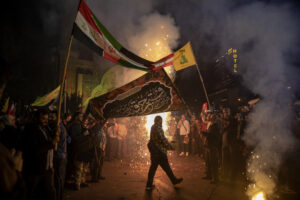Even if its form is military, war is always a political struggle. And in spite of all the anti-Israel demonstrations around the world, Israel is definitely winning the political war — the real one, waged not in the streets but in the foreign ministries of adversaries, neutrals and allies.
How times have changed since 1967, when socialist Israel still enjoyed the enthusiastic support of global “progressives”, but was so diplomatically isolated that it received no support at all from Europe or America when openly threatened with war by Egypt, Jordan and Syria. Before launching its pre-emptive attack, only France had been willing to sell weapons to Israel, but Charles de Gaulle stopped all further sales as soon as the fighting started. In Rome, meanwhile, a cargo of gas masks headed for Tel Aviv was intercepted at the airport, even though Egypt’s occupying force had recently killed many in Yemen with phosgene and mustard gas.
For Israel, however, the greatest penalty of its diplomatic isolation was the inevitability of the UN Security Council imposing a ceasefire as soon as it started to win. In 1967, this came after only six days of fighting. Israeli forces had just fought their way up the steep tracks onto the Golan Heights when they had to stop. I was there myself, eager to visit Damascus when the Soviet Union found itself unopposed at the Security Council in demanding an immediate ceasefire.
It was much the same during the Yom Kippur war of 1973. Caught by surprise by simultaneous offensives from both Egypt and Syria (overconfidence is definitely an Israeli trait), the Security Council did nothing as Israel suffered 10 times as many casualties as in all of the Gaza fighting to date. Moreover, when the US finally agreed to airlift urgent supplies, neither the UK nor France nor Spain would allow its transport aircraft to fly over their airspace. Only Portugal permitted a refuelling stop in the Azores, and even US supplies stored in Europe had to be flown there before being turned around to Israel.
But once again, as soon as Israel was able to overcome initial defeat, the inactive Security Council suddenly became active. With Britain just as vehement as the Soviet Union — which was desperate to stop the rout of the Arab armies it had lavishly equipped and trained for years — the Council powers tried to impose a ceasefire on 22 October. The Israelis tried to fight on regardless, but were forced to stop two days later when Henry Kissinger decreed a nuclear alert in response to Moscow’s threat to intervene with its airborne forces.
At the time, the British and French were fiercely determined to gain the favour of the new oil nabobs who were such good customers for both Bond Street jewellery and jet fighters. As for Washington, whose foreign policy was entirely shaped by Kissinger, nobody wanted to bother with Israel, then still a poor country that had to spend one quarter of its GDP to rebuild its battered forces. This time, 50 years later, it has all been very different. The US, UK and European Union did not try to stop the Israeli counter-offensive against Hamas. The US found itself unimpeded in sending military supplies, while the Italian government came out in full support of Israel.
On the other side, in UN venues highly suited for empty words, Russia and China both ceremonially declared their support for the Palestinians. Yet Moscow has continued to co-operate smoothly with Israel’s air force as it operates over Syria to attack Iran’s Revolutionary Guards, while not one Chinese partner has withdrawn from any joint venture in Israel. Nor did the rising calls to reduce the bombardment of Gaza, led by Belgium of all countries and eventually backed by the White House, have any actual consequence — Israel’s bombing was reduced in any case by the diminishing supply of worthwhile targets.
Likewise, not one of the Arab countries with whom Israel has diplomatic relations has interrupted them in any way, while relations with Egypt have blossomed into a veritable security partnership over Gaza and Sinai. Even more important are the statements of Saudi Arabia’s Foreign Minister, who has made it clear that normalising ties with Israel will not long be delayed once the fighting ends. Even though intelligence exchanges and multiple technology joint-venture negotiations have been underway for some years without any need for official relations, such assurances cannot be overestimated: they are, after all, definitive evidence that Hamas’s assault on October 7 has failed.
The purpose of that deliberately horrific attack was precisely to stop any alliance between the Saudis and Israelis. That was certainly the goal of Iran, which has every reason to dread the fusion of Israel’s technology with Saudi Arabia’s financial resources: Tehran rightly fears this would entail some form of military co-operation, which in turn might bring Israeli air power within a short distance of its Iranian targets.
For now, though, Saudi Arabia’s declared goals are more prosaic. Just like the world’s venture capitalists, the Saudis believe that joint investments in Israeli tech will be profitable. But far more important is Israel’s proximity, which can greatly facilitate the training of Saudi engineers, technicians and skilled workers — thus achieving progress towards the central aim of putting Saudis to work and ending its reliance on expatriate labour. For Israel, it scarcely matters that the Saudis want a quiet Gaza ruled by reliably corruptible Palestinians, just as in the West Bank, before they start investing their billions; after all, the Israelis themselves obviously need some sort of political arrangement to retreat from Gaza without more rockets being launched the day after.
Israel’s diplomatic success is not just due to its changed economics however: its high-tech military equipment has arguably been more influential. It is the reason, for instance, why India has emerged as a steadfast ally, as it relies on Israeli tactical missiles for both its air and naval forces, along with much else. It is also the reason why the Pentagon does not begrudge military aid to Israel — it benefits from a constant backflow of valuable technology, including famous helmet-mounted display at the core of the F-35 fighters that now equip the Air Force, Navy and Marines.
Of course, such high-tech weaponry did nothing to prevent the October 7 attack, but it has proved itself since. Almost 10,000 Hamas rockets have been intercepted by the Iron Dome, avoiding many deaths and much damage, while a full-scale ballistic missile made in Iran and launched from Yemen was intercepted by an Arrow 3 out in space — mankind’s first instance of space combat. More prosaically, relatively few Israeli soldiers have been killed in Gaza, both a result of their training and their sophisticated equipment.
Nothing could be more extreme than the contrast between Israel’s economic, technological and military strength and the chronic political paralysis afflicting the nation. But in this, modern Israel is also different. The day before Hamas’s attack, Israel was just about the world’s most divided country, torn bitterly between antagonistic camps that could not form a coalition government. But immediately afterwards, an instant coalition mobilised more than 230,000 civilian reservists, only to discover that, at a number of bases, the troop count was distinctly larger, because reservists over the age limits also turned up, some from as far away as Silicon Valley. There was even talk of calling in the military police to send these extras home, surely a first for an institution more usually tasked to return deserters to their units.
Yet no amount of wartime unity will remedy the political tumult — particularly over Gaza and the West Bank — that will return as soon as the fighting stops. Indeed, the Biden administration has been trying to exploit this division to induce the Israelis to accept a ceasefire, counting on the increasingly vocal demands of the hostages’ families to give up all other priorities and liberate them from their agony. Meanwhile, on the other side, an entire battalion of Israeli reservists, who had been withdrawn from Khan Yunis to be demobilised, staged a protest to denounce any reduction in the offensive. They were duly reprimanded for protesting while still in uniform.
Faced with nationwide Israeli support for the war in Gaza, Washington can still take solace in the respect it has earned thanks to the President’s unequivocal backing following October 7. After all, even the hardest of Israeli hardliners knows that US support might again soon be in demand, as it tries to drive back Hezbollah’s forces across the Litani river. Moreover, Biden’s demand that the Palestinian Authority be installed to govern Gaza has much support within Israel as well, simply because of the lack of any other alternative. For now, however, such a conclusion is still a long way off. The necessary ceasefire prelude to every post-war plan is still being held up by Hamas, which demands full control of the entire Gaza Strip, as if it had just won a war. So long as it persists, the Israeli army can continue its war — knowing that, this time, its days of isolation are over.
Disclaimer
Some of the posts we share are controversial and we do not necessarily agree with them in the whole extend. Sometimes we agree with the content or part of it but we do not agree with the narration or language. Nevertheless we find them somehow interesting, valuable and/or informative or we share them, because we strongly believe in freedom of speech, free press and journalism. We strongly encourage you to have a critical approach to all the content, do your own research and analysis to build your own opinion.
We would be glad to have your feedback.
Source: UnHerd Read the original article here: https://unherd.com/




